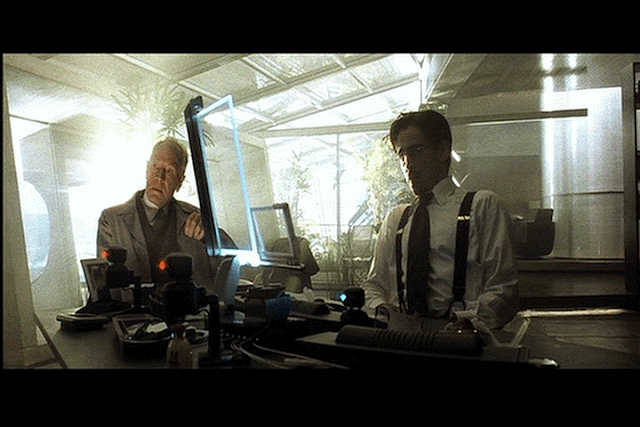Sunday, September 23, 2012
What this one shot of Minority Report tells us...
The shot above is a medium shot from the movie Minority Report. It is pretty much straight on (neither high nor low angle).
On the left is Lamar Burgess, who is in the light, suggesting he knows something. Danny Witwer is on the right, but he is in the dark because he does not know the information Burgess knows. The left side of his face (from the camera's perspective), is however slightly lit up, suggesting maybe he is on the verge of uncovering something. This would explain why there is a concerned look on Burgess' face; he is worried that Witwer is close to knowing what he knows because his face is starting to light up.
Another interesting observation is that the background behind Burgess (the left side) is all curved and slanted. Throughout the movie, Spielberg uses circles or round objects to suggest secret or illegal activity, such as murder. For example, the "murder predicting machine" shown in the beginning of the film turns a cubic wooden block into a sphere when a murder is committed. Conversely, on Witwer's side of the room (the right side), everything is perfectly straight and rectangular in the background, or in other words, there are only 90 degree angles, suggesting that he goes by the rules and has nothing to hide.
A last key difference is how each character is dressed. Burgess is wearing his suit jacket, which tends suggest power in film (the higher position you hold, the more formally you will typically dress. It also suggests that maybe he is covering himself up or hiding behind his jacket so nobody can see the real him. Witwer, on the other hand, has clearly taken off his outer suit jacket and not holding anything back.
So, just by looking in depth at the shot and ignoring all other parts of the movie, one can reasonably conclude that Burgess knows something that Witwer doesn't, and he is trying to cover it up because it may be something illegal. This shot is contrast to the previous scenes in the movie, where Burgess is made out to be good and Witwer is made out to be the bad guy. Therefore, I belief it exists to shift the viewers viewpoint and show us the bad side of Burgess because, as it turns out, he did commit a murder that Witwer, now not so much a bad guy, is on the verge of discovering. One can also make extremely different conclusions, but having seen the movie, that's how I'm seeing it.
Subscribe to:
Comments (Atom)
